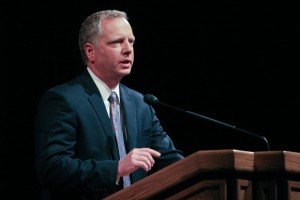The associate dean of the School of Accountancy, Steve Glover, delivered the May 13 Devotional address, highlighting the importance of religious education coupled with secular learning.
Glover began his remarks by sharing a question that bothered him throughout his childhood.
“Would the highest degree in heaven be a very nice, but humorless place?” Glover asked.

He then played a clip by former Apostle Legrand Richards. Elder Richards, as a speaker, would often give little heed to his pre-prepared notes and speak from his heart, giving way to a lively personality and sense of humor.
“Elder Richards was a man of wit and good humor,” Glover said. “My concerns about fitting in with people who qualified to return to our Heavenly Father just simply faded away that day.”
Glover followed the anecdote with another on how one of his college professors mocked religion in one of his classes. He then approached his teacher after class and confronted him about the matter, to which his teacher responded, saying, “We find the more education people get, the less they need the crutch of religion.”
The associate dean explained how placing more importance on education over religion was a logical fallacy, emphasizing two concepts taught by former BYU president Rex Lee: the “rational process” and the “extrarational process.”
The “rational process” is a “problem resolution by thoughtful inquiry,” Glover said, whereas the extrarational process was explained as something that “comes through contact with Godly things and revelation.”
He shared a story about a man he home taught named John, who was not a member of the church but attended meetings and called himself a “dry Mormon.”
Glover shared how John had been using the “rational process” to attempt to find answer to things that required the “extrarational process” and that it wasn’t until after John applied this process that he understood the importance of baptism.
He followed that story up with a story about his great grandfather, Morris David Rosenbaum, who was born to a Jewish family but was curious about religion as a child. This curiosity drove him to investigate “Mormonism.”
Rosenbuam eventually was baptized and sealed in the temple, and this led to generations of active posterity, including Glover.
Glover shared his grandfather’s story as an example of how the “extrarational process” can lead to confident answers from God.




